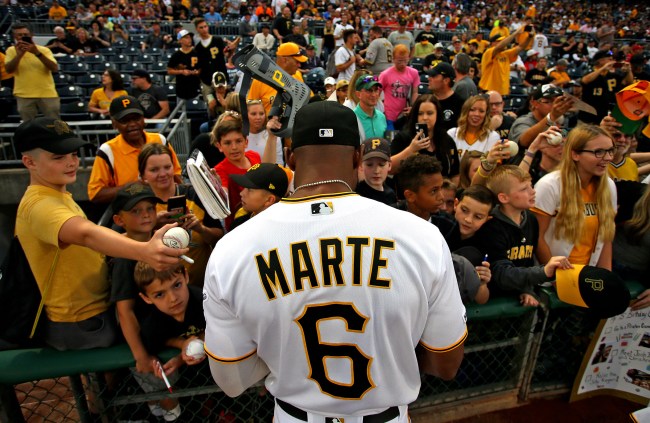
Getty Image
While much of America worries that its sporting events, including the Major League Baseball season, will be played in front of empty seats, three teams, the Pittsburgh Pirates, Tampa Bay Rays and Miami Marlins are three teams that certainly can’t afford that to happen.
Prior to the 2018 Major League Baseball season, the MLB Players Association filed a grievance against the Pirates, Rays, Marlins and Athletics claiming those four small market teams were not complying with the rules of how they are supposed to be spending their revenue sharing money.
Last week, the MLBPA filed a second grievance against three of those teams, the Pirates, Rays and Marlins, yet again over the exact same issue.
In 2016, the Pittsburgh Pirates’ player payroll was $99 million. In 2020, the Pirates will have a payroll of $51 million – the third lowest in Major League Baseball, according to The Athletic.
One spot above the Pirates when it comes to team payroll are the Rays at around $59 million, and one spot below Pittsburgh are the Marlins at $47.4 million. Only the Baltimore Orioles at $45.5 million will have a lower Opening Day payroll.
The Marlins’ payroll dropped from $107 million in 2017, while the Rays have been in the bottom of the league for payroll, ranking in the bottom four every season since 2015, and declining from $69 million in 2018 to a projected $59 million in 2020.
This is the third time in the past decade the MLBPA has filed this particular grievance against the Marlins. In 2010, Major League Baseball forced the Marlins to increase their payroll, but, obviously, that didn’t last.
According to The Athletic…
The Basic Agreement requires teams to use their revenue-sharing receipts “in an effort to improve its performance on the field.” In addition to player salaries, funds may be used for bonuses for draft picks and international signings, to hire scouts and staff, to improve technology systems, and for upgrades in the player development system.
“We view revenue-sharing recipients who remain in that perpetual rebuilding mode as a concern,” MLBPA president Tony Clark told The Athletic. “It’s one area that in collective bargaining we’ll look to increase the club incentives for competitiveness. That’s part of the concern we have had and that we have voiced over the last handful of years, and it will be reflected in our proposals across the table.
“We view revenue-sharing recipients who remain in that perpetual rebuilding mode as a concern. It’s one area that in collective bargaining we’ll look to increase the club incentives for competitiveness. That’s part of the concern we have had and that we have voiced over the last handful of years, and it will be reflected in our proposals across the table,” Clark added.
“We think it is time, based on what we are seeing, to dig a little deeper into those specifics in order to make sure that what the revenue-sharing system was designed to do is actually happening.”